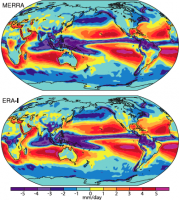The National Center for Atmospheric Research (NCAR) has, in the last few months, developed an interesting and potentially very useful website The Climate Data Guide devoted to the ins and outs of obtaining and analyzing the various existing climatic data sets. The site describes itself as “…a focal point for expert-user guidance, commentary, and questions on the strengths and limitations of selected observational data sets and their applicability to model evaluations.”
There are already many climate data set websites in existence, and lists of links to same, including at this site. Some of them host the actual data, while others provide various statistical analysis or graphing/visualization tools, all of which are helpful. What makes this new site unique is: (1) expert users contribute pages describing and pointing to various existing data sources within certain topic areas, (2) explanations of various existing data formats, gridding approaches, etc, (3) an online discussion forum dealing with the appropriateness of particular data sets for addressing particular scientific questions, and (4) a news section as well as links to a very wide range of data repositories, among other things. Here for example, is the page summarizing the existing reanalysis data sets.
The site, sponsored by the NSF, appears to be a unique and valuable approach to advancing climate data analysis. We encourage everyone to check it out, register as members as appropriate, etc. This would also be a good place to discuss or point to other useful data and analysis oriented sites that are out there.


This is superb. I notice that the software overview page does not mention Python among the interpreted languages.
https://climatedataguide.ucar.edu/processing/software/overview
Those others must be very good indeed.
1, Pete,
Following some of the links and just briefly perusing them… CDAT seems to generate Python code.
Hmm, a bit of trouble with the link.
Google found this:
http://climatedataguide.ucar.edu/
. . . which worked.
Yet clicking the link gave this:
https://climatedataguide.ucar.edu/
. . . which did not.
Guess that “s” is the problem–didn’t spot the difference ’til I printed them both out!
What a good idea. It seems a friendly place; they let me sign up, though I’m pretty clearly a general-public sort of guy and it’s pitched at practicing scientists and students in the field. But I think it makes sense for an effort like this to cater to “citizen scientist” types too. With increasing numbers of us playing sorcerer’s apprentice with all those lovely data at the beck and call of our little R spells, anything that will prevent us jumping to spurious conclusions and trumpeting them all over the internet is likely to save you guys time cleaning up after us…
re #4 – Thanks for the positive feedback on the site. You are correct about the intended audience for the site and the discussion and contribute features are indeed oriented towards that crowd. As I came to appreciate at the recent WCRP conference, ‘relevant’ professions and fields of study are becoming very numerous. Without any registration, the general public will find a lot of information summarizing the key features and applications of various climate data sets. Experts who can contribute to the site or students/scientists/professionals who have data questions are very much encouraged to register.
re #1 & #2 – Yes, CDAT is based on python.
re#3 – It should work with or without the ‘s.’ Use the contact form if you have any more problems or suggestions.
Also check out (NOAA, climate website, currently running a survey for user feedback).
They plan “Widgets” for the climate data, to improve climate data appearance on the internet. To provide a really nice visual with up to date NOAA climate data, for all kidn of web projects.
http://www.climate.gov/
#5–
I think the difficulty is with my browser; at any rate the message I get is that it can’t establish a “secure” connection. With the http version, presumably, that issue is side-stepped. Does that affect functionality at all–ie., are there things only doable with secure connection?
I ask more from curiosity than from any expectation that I personally will be actually needing to delve deeply into the data!
Wonderfully readable summary of dataset characteristics! From looking into the CERES EBAF pages, I see that expanding “Basic Information” and then clicking underneath “Download Links” leads me to the data originator’s website … but then I get a timeout error. Do I need to be registered in order to download data via climatedataguide.org?
No special authentication is needed to follow the links from Climate Data Guide. Data distribution is up to the originator. On the CERES website, it says that their data subset tool is down today. That explains the timeout, but maybe we’ll want to change the link to a higher-level site.
Real Climate is the only site that I can find that doesn’t revert to partisan comment either by omission or cherry picking of data.
The marine environment is my workplace and I need all the help that I can get.
Dave I completely Agree!.Too many people simply can’t provide complete information, especially in topics like this!.